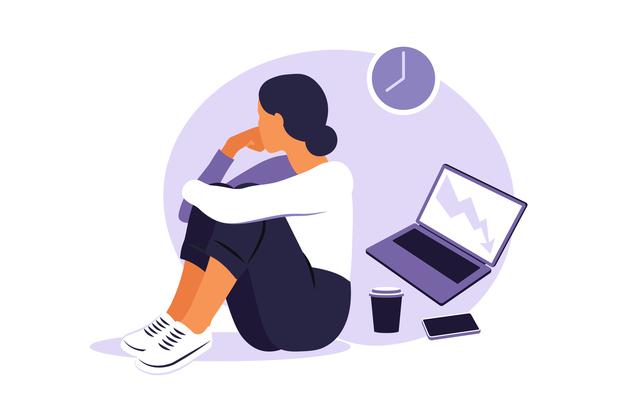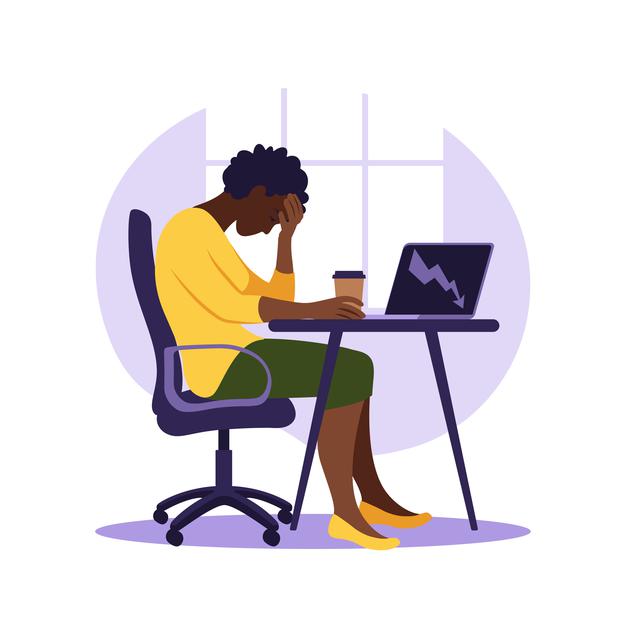Burn-out is a state of emotional, physical, and mental exhaustion caused by excessive and prolonged stress. According to WHO, burn-out is included in the 11th Revision of the International Classification of Diseases (ICD-11) as an occupational phenomenon. In ICD-11, burn-out is defined as follow:
“Burnout” isn’t a medical diagnosis. Some experts think that other conditions, such as depression, are behind burnout. Burn-out is a syndrome conceptualized as resulting from chronic workplace stress that has not been successfully managed. Some research suggests that many people who experience symptoms of job burnout don’t believe their jobs are the main cause. Whatever the cause, job burnout can affect your physical and mental health.
Burnout is Common
61% of people are stressed out with their current jobs, according to the American Psychological Association. That stress has very real consequences. Over half of all people who responded to a survey conducted by Comparably in 2018 indicated that they felt burnt out at work. They even have a whole list of cities who experience the highest levels of burnout with people who are affected physically, emotionally, and mentally by job stresses. They dove down saying that of those same people, most who suffered from burnout weren’t just baby boomers, but millennials, too
So what can you do besides sleep more and work less? First, it’s important to know the warning signs of burnout. You may keep trying to fight through some rough patches, taking out your frustrations on the world, but realistically, if you don’t know what to look for, you don’t know when you need to take action. The closer we can get to identifying the source of the problem, the clearer the remedy will be.

Symptoms
It shares some similar symptoms of mental health conditions, such as depression. Individuals with depression experience negative feelings and thoughts about all aspects of life, not just at work. Depression symptoms may also include a loss of interest in things, feelings of hopelessness, cognitive and physical symptoms as well as thoughts of suicide
Ask yourself:
- Have you become cynical or critical at work?
- Do you drag yourself to work and have trouble getting started?
- Have you become irritable or impatient with co-workers, customers or clients?
- Do you lack the energy to be consistently productive?
- Do you find it hard to concentrate?
- Do you lack satisfaction from your achievements?
- Do you feel disillusioned about your job?
- Are you using food, drugs or alcohol to feel better or to simply not feel?
- Have your sleep habits changed?
- Are you troubled by unexplained headaches, stomach or bowel problems, or other physical complaints?
If you answered yes to any of these questions, you might be experiencing job burnout. Consider talking to a doctor or a mental health provider
Why Workers Get Burn-Out?
As an occupational context, the reasons often from stress related to the job. But anyone who feels overworked and undervalued also at risk for burn-out. From the hardworking office worker who hasn’t had a vacation in years to a stay-at-home mom who tending to kids, homework, and an aging parent.
Some of the reasons why workers get burn-out from works might be that they feel they don’t have control over their works. Unclear or overly demanding job expectations also can contribute to this. Modern workers often face high-pressure from their boss who also almost not giving or lacks giving the workers any recognition or reward they deserve.
Not only from the job,
but lifestyle also may cause burn-out. If someone works too much without has
enough time to relax, they might get burn-out. Not enough sleep and lack of
supportive relationship also might contribute to this.
Common Factors of Burn-Out
There are many things that can lead to job burnout, and it differs for every person. But there are common factors that can be identified as reasons behind burnout and stressors at your workplace
- A feeling of little control. Not being able to make decisions about your schedule or workload can lead to job burnout.
- Being unsure about your expectations. If you don’t know what your manager will expect of you, you’re likely going to be frustrated with your work.
- A poor work culture. The attitude and morale of people around you will directly impact your satisfaction with your job. A boss who micromanages you, cliquey coworkers, and a lack of friends at your office can lead to job burnout.
- A lack of work-life balance. If you’re giving a lot of your energy and time to work, your personal life can suffer, which can lead you to resent time at the office.
- High engagement with your work. Being over-engaged with your job can lead you to feel a constant need to overwork and be involved with projects. This leads to stressful situations, and emotional exhaustion. While being highly engaged good thing, it can also lead to high job stress and burnout. For example, while millennials tend to value work/life balance, they may have an increased risk of developing burnout because they are highly driven and motivated in the workplace.
How to Deal with Burn Out
Although the term “burnout” suggests it may be a permanent condition, it’s reversible. An individual who is feeling burned out may need to make some changes to their work environment.
Approaching the human resource department about problems in the workplace or talking to a supervisor about the issues could be helpful if they are invested in creating a healthier work environment. In some cases, a change in position or a new job altogether may be necessary to put an end to burnout.

Other Option for Dealing with Burn Out
The best way to deal with burnout, is to prevent it from happening in the first place. While this isn’t always possible, there are treatment options if you’re currently experiencing burnout as well.
1. Take A Vacation
Talk to your manager about taking a break. Not a one or two days leave where you mostly stay at home, but more like a total cut-off from work. You need to explain why you deserve time off from work and how it can help you be even a better employee when you return.
Ideally, you need a break for at least two weeks without contact with your work. So, don’t open any work-related email, don’t take any calls from work, and go enjoy your much well deserve break.
Go to places you always want to go. Enjoy your hobby.
2. Have a Heart-to-Heart with Someone Close
Another way to release the tension you feel from work is to have a heart-to-heart talk with someone close. It might be your parents, your partner, your closest friends, or perhaps even your co-worker. But be careful not to share too much with your co-worker because it might spread as gossip that will work against you.
This someone doesn’t need to be in the same industry as you do. They simply can be a shoulder to cry on. All they need to do is just sit there and listen to your frustration and despair. So, choose carefully who you want to have a heart-to-heart talk with regarding your work.
3. Work Away from Your Desk
A change in your work environment is always a good option. Therefore, try asking your manager if you can work in a coffee shop, library, or even a park. You might find new inspiration for your work there. Also, don’t bring your work home. You need to make effort to separate work life from home life.
4. Get Plenty of Sleep, Exercise, and Eat Well
When we get stressed, we always look for ways to comfort ourselves, am I right? Maybe for you, you might eat your favorite comfort foods or binge-watching your favorite tv show. However, those activities rarely cure burn-out. Instead, make a plan to exercise more and eat healthy food. Get a good eight hours of sleep every night. Put your gadget away before sleep so you don’t end up scrolling on your social media till midnight.
5. Find a Release
If you let yourself burned out for too long, it might lead to a pressure cooker of stress. Because if you don’t release it, you are going to explode. Not literally, but more like emotionally. Physical activities are ideal for stress release. For some people, it might be going to the gym or boxing. For others, it might be football, badminton, or even bowling. But maybe for you, it’s hiking or tracking. Find a healthy release for your burn-out and don’t harm yourself by doing it. The main idea is that you should let off some steam from work.

Burn-out is a serious problem that could affect your mental, emotional, and physical health so you should never underestimate this. Do whatever you need to do to make yourself better.

